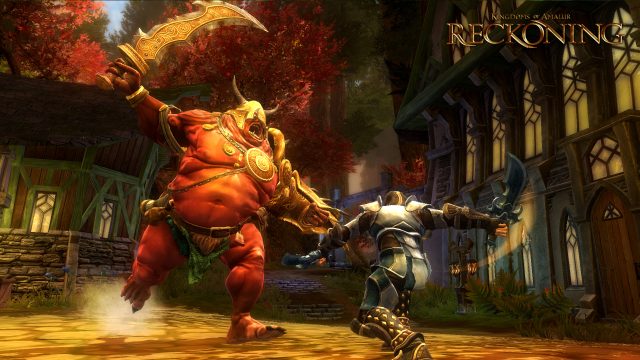
A month or so before the stunning financial collapse of Curt Schilling's 38 Studios, I plunked down $60 for Kingdoms of Amalur: Reckoning, the only game the studio ever made. I couldn’t get enough. I played day and night, happily shelling out another $20 on expansion packs to keep questing and battling well past 50 hours.
As a lifelong Red Sox fan and video game nut, I was happy that a man who helped the Sox win two World Series was the driving force behind a game I loved. But then, everything collapsed for Schilling, the sports hero who wanted success in the video game industry so badly he abandoned his political principles to achieve it.
Curt Schilling. Even if you've never watched a baseball game, you probably know his name by now. He’s that guy who bilked Rhode Island taxpayers out of hard-earned cash. The guy who said government-funded programs are nothing but trouble, then built a company with $75 million in Rhode Island taxpayer money. The guy who blamed the state that gave him all that cash when he couldn’t pay his bills and laid off his entire staff of 379 employees.
It’s enough to make you glad you don’t live in Rhode Island.
But once upon a time, Curt Schilling was a hero.
In October 2004, Red Sox fans needed a hero. As it turned out, we got a whole team of them who vanquished the evil New York Yankees and ended 86 years of sports fan hell. But only a few took on a special status, becoming Boston legends, and one of them was Curt Schilling.
With a heinous ankle injury no sane pitcher would play through and a Red Sox doctor crazy enough to invent a new surgery to appease the demands of that insane pitcher, a (literally) bloodied Schilling pitched the Sox to a Game 6 victory over the Yankees and a World Series win over the St. Louis Cardinals. Relegated to walking on crutches after the season, he had sacrificed his body in an act that induced more happy thoughts in New England than any anti-depressant.
Still hobbled, Schilling struggled throughout 2005 but ended his career with another World Series win for Boston in 2007. His legacy was sealed for life.
After baseball
But something funny happened after that. Schilling got... annoying. As Boston fans, we just wanted to worship Schilling for what he’d done. It’s not fair to expect celebrities to stay on a pedestal and never act like human beings, but his self-serving grandstanding on steroids, blogging about whether he might or might not run for US Senate, and constant sounding off about sports and political issues made a lot of people want to slap a piece of duct tape over his mouth.
I mainly ignored everything Schilling did post-2007, choosing only to remember his great deeds for my favorite baseball team and applauding his charity work fighting Lou Gehrig’s disease. As long as I could watch my Red Sox World Series DVDs, I didn’t care what he did outside baseball. I ignored Schilling’s "other side" the same way I pretend Tom Brady isn’t a Yankees fan, and that the Celtics have never lost to the Lakers.
But recent events surrounding Schilling's game company utterly destroyed his reputation, and it was entirely his fault. Today, Schilling blames the government for not helping him enough, whereas two years ago he was blaming the government for handing too much money to people just like himself.
"What Government run/funded program in this country’s history has ever been run with an ounce of financial responsibility, prudence, or with the peoples [sic] best interest at the forefront? None, that’s which one."
That ironic quote comes from Schilling’s blog in January 2010 when he was supporting Scott Brown for US Senate. At the time, Schilling was months away from working out a deal with the Rhode Island government that would bring his game company, 38 Studios, a $75 million guaranteed loan.
Back then, Schilling was touting 38 Studios’ plan to "bring anywhere from 100 to 500 new jobs (at salaries north of 75k a year) into the state it does business in over the next 5 years." In the same blog post he decried the "health care plan that this already broke country doesn’t have a dime to spend in attaining" while asking, "In this state alone how many elected officials SHOULD have gone to jail in the past 12 months?"
38 Studios, meanwhile, wasn’t taking a dime in government cash, all while offering the "gold standard in health care and benefits to its employees," Schilling wrote.
But that was months before the $75 million in government funding convinced Schilling to move 38 Studios from Massachusetts to Rhode Island, a move Massachusetts taxpayers should be grateful for. Those jobs Schilling might have created in Massachusetts went to Rhode Island instead—temporarily.
Amalur was released in February this year on Windows, Playstation 3, and Xbox 360. It got some reviews that were good and some that were bad, but it’s what followed that brought down Schilling and 38 Studios.
While Amalur sold well enough to justify its existence with sales of 1.2 million copies, 38 Studios hemorrhaged cash as it worked on a much larger massively multiplayer online role-playing game that hasn’t seen the light of day.

On May 1, 38 Studios missed a $1.12 million loan payment to Rhode Island. After one bounced check, a payment eventually cleared on May 18, but the studio couldn't meet payroll. A few days later, 38 Studios laid off its entire staff of 379 people (a big staff for a startup), violating federal law by not providing the required 60-day notice to employees and state unemployment officials in the event of mass layoffs.
Not the best example of a job creator
38 Studios filed for bankruptcy on June 7, but not before Schilling blamed Rhode Island Gov. Lincoln Chafee for his woes, saying the state should have provided another $8.7 million in tax credits to 38 Studios, should have let the company delay its $1.12 million loan payment so it could make payroll, and that Chafee’s "devastating" remarks about the financial health of the company scared off private investors who might have saved it. With 38 Studios floundering, a video game publisher pulled out of a $35 million deal to finance an Amalur sequel, Schilling told the Providence Journal.
Just a few days after laying off all his employees, Schilling called himself a job creator.
"I have done whatever I can do to create jobs and create a successful business, with my own income," Schilling said. "Fifty million dollars, everything I've ever saved, has been put back into the economy. The $49 million from Rhode Island has been put back in the economy. I've never taken a penny and I've done nothing but create jobs and create economy. And so how does that translate into welfare baby? I've tried to do right by people."
How much of his own money he’s actually invested seems to be up for debate. Chafee, who opposed the loan while running for governor, said the state is still trying to figure out how much Schilling chipped in himself, and is conducting an audit of how the company used state money. A report from WPRI says Schilling "personally guaranteed a $4 million revolving line of credit from Middlesex Savings Bank in July 2010," but then used a portion of the $75 million Rhode Island loan to pay that credit line down to $1.5 million, essentially using taxpayer money to pay himself back for his own investment. The bankruptcy has kicked off a formal probe from both "state and federal law enforcement agencies," which have sent out subpoenas to gather information.
With creditors circling 38 Studios, Schilling is personally being sued for $2.4 million by Citizens Bank. The Massachusetts attorney general's office is also being asked to investigate the studio for luring workers from Massachusetts to Rhode Island by promising to help them sell their homes and pay their mortgages, and then reneging on that agreement.
Rhode Island’s total bill for paying off 38 Studios’ debt may actually be $89.2 million through 2020, WPRI reported after examining the structure of the loan received by the game company. The total costs are $112.6 million in principal and interest payments, but $23.4 million of the original $75 million loan was set aside for emergencies—like the complete implosion of 38 Studios.
As brazen as Schilling has been in blaming the government for his money problems, his attitude is actually more reserved compared to his past complaints about the "bloated, criminal laden Government" trying to force health insurance laws on the beleaguered citizens of the United States.
The free market = handouts for sports teams and millionaires?
It’s idiotic that Rhode Island gave 38 Studios the money to begin with. I am a fanatic of both sports and video games, yet governments providing millions of dollars to prop up video game companies strikes me as even more ludicrous than spending hundreds of millions in taxpayer money to build stadiums that mostly benefit billionaire sports team owners.
I'll leave it to economists to explain exactly what went wrong, but it's not hard to imagine that proper management of Schilling's venture could have produced a better outcome.
Beyond finances, let's not overlook what might seem to be a rather trivial part of this whole story: the actual game, Kingdoms of Amalur: Reckoning, wasn't a failure. As I mentioned, I loved this game. Skyrim didn’t appeal to me because the battles were clunky and boring. Amalur was criticized because its story was weak, but I think the amazing, God of War-like battles, and the user-friendly quest system made it the most fun and accessible RPG in years.
In exchange for handing $75 million to a company before it ever accomplished anything, the state of Rhode Island gets to take ownership of the Amalur intellectual property. Taxpayers there will never fully be repaid for the debacle spawned by Schilling and their own foolish government. For me, spending $80 to have hours of fun was a good investment—I can only hope a few of the dollars I spent on Amalur will get back to the people who unwillingly paid a millionaire crybaby to build it.
reader comments
100